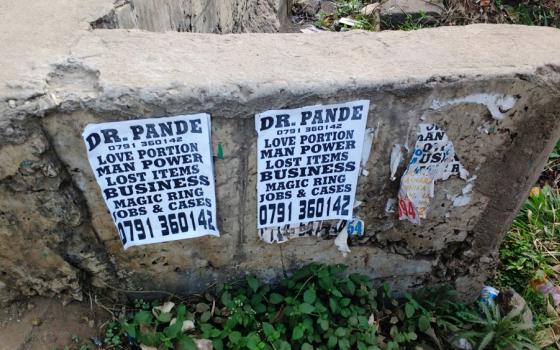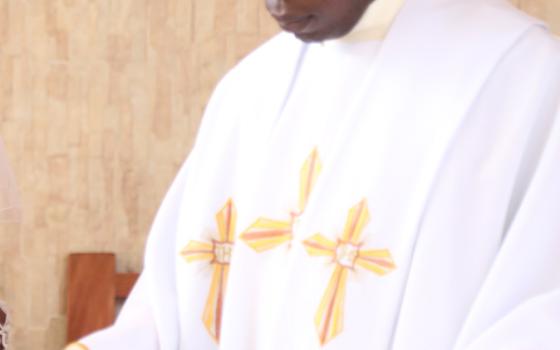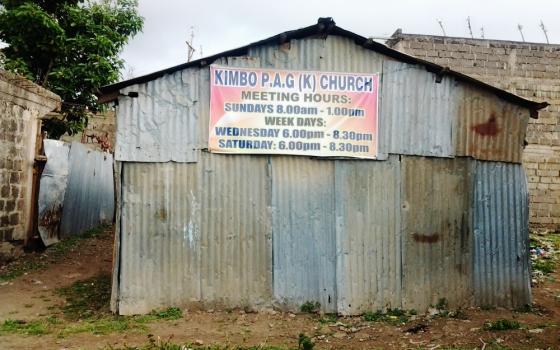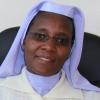At the end of a Mass celebrated by a visiting bishop in August at Radio Waumini compound in Nairobi, one of the worshippers started "manifesting" out of nowhere — wailing, shouting, coiling herself on the ground. A family member approached a young priest in attendance, asking him to pray and lay hands on the distressed woman.
Fr. Gerald Umunyin of the Contemplative Evangelizers Institute recalls his experience that day. Only two years into the priesthood, he said, he felt overwhelmed. He approached the bishop, who referred him to the senior priest. The senior priest was busy doing some consultations and instructed him to go ahead and pray for the wailing woman.
"Afraid and not knowing what to do," Fr. Umunyin said, "I pulled my mobile out of my pocket and called one of our priests renowned for 'deliverance.' "
"Gerald, do not be afraid," he said he was advised. "Take holy water with you and go pray for the person with confidence, commanding those evil spirits to come out."
Fr. Umunyin did just that and, after a long exercise of prayer, petition, laying on of hands, and sprinkling of holy water, the woman eventually lay still and stood up after a while looking confused. The young priest was excited he had succeeded in driving out demons, he recalls.
I come from a culture where witchcraft still reigns supreme. Witch doctors are highly consulted because, like in the rest of Africa, bad omens, such as accidents, diseases, poverty and death, don't just happen. Somebody is believed to have cast a spell on the victim and, therefore, witch doctors come in handy to unravel the hidden mystery. It is not surprising that, with the onset of HIV/AIDS, the sufferer was thought to have been bewitched and therefore only a witch doctor could supply a solution. A second alternative is to seek deliverance from one of the churches mushrooming on every corner of the neighborhood; after all, the finger of the bad spirits must be rooted out regardless of the means.
Witchcraft is common in many regions of Africa. In a 2014 study by the Association of Consecrated Women in Eastern and Central Africa and published by the Catholic University of Eastern Africa Press, 77 percent of 133 religious respondents in Kenya said witchcraft is practiced in their ethnic communities, and 53 percent believed it was on the rise. Among the 36 respondents who are sisters in Malawi, 75 percent said there is the presence of witchcraft in their communities and 75 percent said that the practice is on the rise.
In a recent online issue of Catholic Information Service for Africa, charismatic priest Fr. James Burasa, comments, "The main challenge priests face in their pastoral work as far as the evil spirit is concerned is lack of knowledge. There is a secret recruitment that is going on and no one is challenging it. The number of people who come to us for deliverance is overwhelming. It is high time parents talked to their children, schools talked to their students and pastors created awareness about this phenomenon."
Sr. Rebecca Maina, a Little Sister of St. Francis, is not new to these phenomena, having taught at and headed three secondary schools for more than 30 years. Although she does not carry out the work of "deliverance," she attests that the practice of initiating young girls into worshipping the devil is rampant in schools.
"In my experience, the girls being recruited are very innocent and at the same time ignorant. They are not told anything beforehand; they can be given a banana or a sweet and, once they eat, that's it," the initiation is sealed, says Sr. Maina, the principal of Mt. Laverna Secondary School, located in the outskirts of Nairobi.
"One day I walked into the girls dormitory and found them playing, having great fun. I observed that one of them would gently bite the other girls' right hand to leave an indelible mark of the teeth. The girls found joy in seeing the marks on their hands without realizing they were being initiated to a secret society, into worshipping the devil," she says.
A few days later, Sr. Maina detected that the marks of the teeth were noticeably visible on the hands of the girls, something abnormal in the school environment. When she demanded an explanation, the initiator girl knew she was already in for trouble. She had no alternative but to reveal her mission.
"I am a member of the secret society and I was sent to initiate as many students as possible," she said.
Later, upon being confronted by her parents and the principal, the girl bluntly exclaimed, "I am already at an advanced stage and I cannot quit. I would rather be expelled."
Fr. Burasa, in an email interview with me, wrote: "The ones doing it [recruiting] are anyone who accepts to be an agent of the devil. Many people are not told that they are going to worship the devil. They seduce them, using whatever means, and they reach them on a level where they vow.
"It is the vow that gives the devil the consent," he said.
While devil worship is rampant in every town in Kenya, Fr. Burasa says, several other satanic cults common to other religions exist — each with its own ways of recruiting new members.
In my discussion with Sr. Maina at her office, she said some students told her they belong to a vampire group. "What is a vampire?" I wondered out loud. "These students could say no more than just that," said the Franciscan head of the Mt. Laverna girls school. "Everything about devil worship is so secretive that they would rather die than speak out of their engagement with the world of darkness."
My next question to Sr. Maina was a sensitive one. "Do sisters worship the devil?"
She has heard stories of sisters who have involved themselves in devil worship and even witchcraft but had no facts.
Fr. Burasa, the exorcist, put it plainly: "I would not wish to share confidential matters regarding sisters' lives, but, yes, they go to consult the witch doctors. … [The attack of the devil] can be related to family background, dabbling in sin — especially against the First Commandment — or an enemy using the negative force against a fellow sister. This last case could not affect a person who knows how to pray. When in spiritual warfare, we sometimes need to do more than the traditional way of praying."
There is a difference is between devil worship and witchcraft. While witches tend to deny the existence of Satan as a personal being, most devil worshippers affirm just the opposite. They call on and worship Satan, although they may differ on their individual conception of the devil. Devil worshippers generally believe that magical rituals are the keys to increasing personal power, and they regard sacrificial offerings (whether symbolic or actual) as a desirable means to achieve their own ends. Witchcraft and devil worship are equally satanic in the sense that they both oppose God's teachings and are demonically inspired.
I had my own brush with this cultural phenomenon and the fears that come with it. I remember back in my village in the early '90s, we lost the mother of a friend of mine to such beliefs. She was rumored to be a witch. Her husband had three wives, herself being the first wife. The offspring of her co-wives were all school dropouts, drunkards and living aimlessly. They attributed their predicament to a bad spell cast on them by their stepmother (the mother of my friend, who would later become a nun). One day, one of the sons went into her house and struck her on the forehead with a wood axe, killing her.
"She has been bewitching us that we cannot prosper in life," he said. The stepson was later tried in court, convicted of murder and jailed for his crime.
I came to know sister in our late teens, both of us hoping to join religious congregations soon. I would pass by their home to get her and walk to church on Saturdays to clean or work there. One day I faced the wrath of my mother, having mentioned that I was offered a cup of tea at their place and drank it. "She will bewitch you," she warned me of my friend's mother. Though I did not share her fear, I heeded my mother's admonition, and never again did I set foot in that compound.
In situations where people lack proper information and direction, such occurrences are to be expected. I understand our people, as Fr. Daniel Ihunnia, of the Missionary Society of St. Paul, describes them. In an article titled "Breaking the Evil Yoke: A Challenge for Mission Theology in Africa," he writes:
"The scourges of poverty, disease, underdevelopment, unemployment and insecurity have left many in total frustration. People dedicate their lives to worshipping the devil without realizing the devil offers fake solutions of prosperity, healing and wholeness. These demons invariably possess and torture their clients, for they never intend the wellbeing of humanity."
To deliver our people from falling prey to devil worship and witchcraft, sisters are uniquely positioned, given their roles as head of schools, to organize seminars and workshops to sensitize our young people about the existence of the devil in their midst. Many of us deal with the youth in our churches and should use the opportunity to talk to them about how they could be recruited to worshipping the devil without their knowledge. We are needed to help these innocent ones, who have been lured into devil worship and witchcraft with empty promises of wealth, success and wholeness.
It is very unfortunate that even some Christians practice witchcraft and others opt to worship the devil in our churches. When we start dabbling in witchcraft we open ourselves up to demonic influences that will, in return, harm us. The devil is very crafty — the father of lies who hates humans with a passion. We must never let him take control of our lives.
[Adelaide Ndilu is a Sister of the Immaculate Heart of Mary and the administrator of Radio Waumini in Nairobi, Kenya.]



